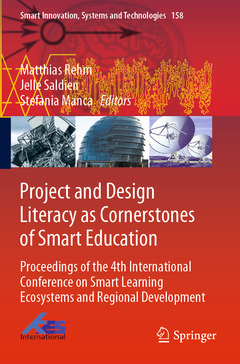Project and Design Literacy as Cornerstones of Smart Education, 1st ed. 2020 Proceedings of the 4th International Conference on Smart Learning Ecosystems and Regional Development Smart Innovation, Systems and Technologies Series, Vol. 158
Langue : Anglais

The book includes high-quality papers presented at the 4th International Conference on Smart Learning Ecosystems and Regional Development at Università Roma Tor Vergata, Italy, from 22 to 24 May, 2019. Providing insights into the relevance of smart learning ecosystems (schools, campuses, the workplace, informal learning contexts, etc.) for regional development and social innovation, it also discusses how citizens? involvement with smart ecosystems can be increased and made more effective.
Educating the next generation of social innovators.- Teaching Experience Design using poems as cultural probes.- The International Summer School for Advanced Studies UniBS: CONTEMPORARY IDENTITIES. Interweaving spaces and relations in the design of living services.- Towards a DSS: a toolkit for processes of co-designing.- The impact of a research-based institutional strategy for opening up educational practices: The case of the MOOC-Maker project.- Engagement in a Blended University Course.- Empowering Engagement in a Technology Enhanced Learning Environment.- The ASLERD Pyramid of Smartness: a study on the stability of indices and indicators in schools.- Smartness comparison amongst different age-group students in an integrated school: the potential for design and management.- A Multidimensional space approach to Innovative Learning Environments.- Concept integration to develop next generation of technology enhanced learning systems.- Improving Writing for Romanian Language.- Aprototype for the automatic assessment of Critical Thinking.- Prediction of Newcomer Integration in Online Knowledge Building Communities using Time Series Analyses.- Challenge of Talent Attraction in Small and Medium Urban Areas: Case of Valmiera City, Latvia.- Smart City Community Engagement Through Learning.- Meaningful Learning by Creating technology-mediated Knowledge Boundary Objects between School and the Workplace.- Smartwatches for Context-Aware Ubiquitous Learning.- Game-based mobile learning with augmented reality: Are teachers ready to adopt it?.- Services, Schools and Skills: Mobile Media and local development in a South African rural area.- A Cognitive-Driven BCI-Based E-Learning Platform For Learning Disorders: A Preliminary Study.- The structured methodological framework “deejay”: foundation and its application to the design of an ASD-oriented AAC tool.- Creating New Learning Experiences for Students with Dyslexia: a Design Thinking and Human-Centered Approach.- Development of a Smart Cycling Support Device for People with an Intellectual Disability.- Social coordination in Human-Robot Interaction through reciprocal engagement.
Dr. Matthias Rehm received his Diploma and Doctoral degrees (with honors) in 1998 and 2001, respectively, from the Bielefeld University in Germany. In 2008, he successfully completed his habilitation process in Informatics at the University of Augsburg in Germany. He is the Head of the Human–Machine Interaction Group in the Department of Architecture, Design, and Media Technology and will be leading the upcoming cross-departmental Human Centered Robot Interaction Lab at the Technical Faculty of IT and Design at Aalborg University. His research is focused on modeling social, affective, and cultural aspects of everyday behavior for intuitive human–machine interactions. He has over 100 peer-reviewed publications in the area of robotics, HCI, technology-enhanced learning, multimodal interaction, and culture-aware technology. In 2010, he became founding and steering group member of Aalborg University’s cross-departmental robotics program Aalborg U Robotics. In 2014, he co-foundedan international, Canadian-based startup that is actively pushing the limits in smart learning technologies. In 2015, he was elected vice president for the International Association for Smart Learning Ecosystems and Regional Development.
Dr. Jelle Saldien is an Associate Professor in the Department of Industrial Systems Engineering and Product Design of the Faculty of Engineering and Architecture at Ghent University, Belgium. He received his M.S. degree in Industrial Science ICT at DeNayer Institute (now KULeuven) in 2003 and an additional M.S. degree in Product Development at Artesis (now UAntwerpen) in 2005. In 2009, he received his Ph.D. at the Vrije Universiteit Brussel on the design and development of the social robot Probo. From 2010, he was lecturer in Industrial Design at the Howest University College West Flanders. Since 2013, he is appointed as a Professor of Industrial Design at Ghent University, research coordinator of the UGent Industrial DesignC
Focus on innovation potential of smart learning technologies for urban and regional development as well as for increased citizen involvement Includes human-centred approach to the usually functional perspective of smart cities Useful for researchers, policy-makers and practitioners
Date de parution : 09-2020
Ouvrage de 288 p.
15.5x23.5 cm
Date de parution : 09-2019
Ouvrage de 288 p.
15.5x23.5 cm
© 2024 LAVOISIER S.A.S.



